

What Campus Leaders Need to Know About MOOCs. KU not spooked by MOOCs: Officials say they're watching free online course trend, but not acting yet. Yale takes time to reflect, evaluate before jumping into MOOCs. How to make a MOOC. U asks: Want to make a MOOC? MOOC Ancestor: Still Looking for Quality Teaching. Massive open online courses (MOOCs) are a new phenomenon, but they have ancestors nearly 100 years old.
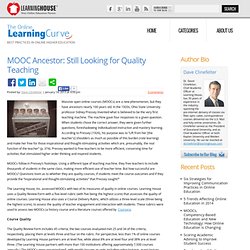
In the 1920s, Ohio State University professor Sidney Pressey invented what is believed to be the very first teaching machine. The machine gave four responses to a given question. When students chose the correct answer, they were given further questions, foreshadowing individualized instruction and mastery learning. According to Pressey (1926), his purpose was to “Lift from her [the teacher's] shoulders as much as possible of this burden (rote learning) and make her free for those inspirational and thought-stimulating activities which are, presumably, the real function of the teacher” (p. 374).
Pressey wanted to free teachers to be more efficient, conserving time for activities that stimulated higher order thinking and inspired students. College Is Dead. Long Live College! On Sept. 17, the Pakistani government shut down access to YouTube.
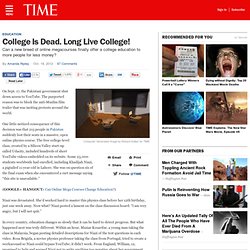
The purported reason was to block the anti-Muslim film trailer that was inciting protests around the world. One little-noticed consequence of this decision was that 215 people in Pakistan suddenly lost their seats in a massive, open online physics course. The free college-level class, created by a Silicon Valley start-up called Udacity, included hundreds of short YouTube videos embedded on its website.
Good MOOC's, Bad MOOC's - Brainstorm. So I just finished a brief radio appearance (CBC) on the subject of Massive Open, Online Courses (MOOCs).
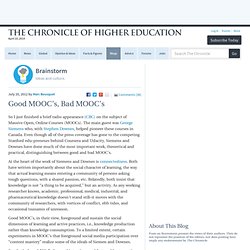
The main guest was George Siemens who, with Stephen Downes, helped pioneer these courses in Canada. Even though all of the press coverage has gone to the competing Stanford edu-preneurs behind Coursera and Udacity, Siemens and Downes have done much of the most important work, theoretical and practical, distinguishing between good and bad MOOC’s. 4 MOOC's and How They Work - Online Learning.
MOOCs: a massive opportunity for higher education, or digital hype? MOOCs (Massive Open Online Courses) are the latest addition to the acronym-bound lexicon of higher education, and quite possibly the most significant of them all.
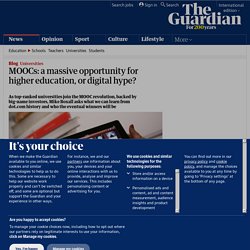
They represent a new generation of online education, freely accessible on the internet and geared towards very large student numbers. Over recent months we have seen a remarkable spate of major MOOC ventures from top-ranked universities including MIT, Harvard, Princeton and Berkeley, offering free access to lectures and courses sourced from world leaders in their fields. And in July, 12 universities in the US and Europe announced their involvement in Coursera, an internet course platform created by two Stanford University scientists.
The phenomenon has been likened by the president of Stanford University to "a digital tsunami", threatening to sweep aside conventional university education. Our (Work) Education Crisis: Send In the MOOCs. (Corrects the identification of Peter McAteer in the seventh paragraph.)
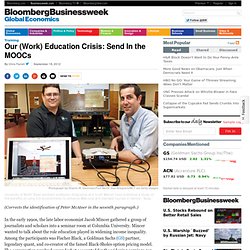
In the early 1990s, the late labor economist Jacob Mincer gathered a group of journalists and scholars into a seminar room at Columbia University. Mincer wanted to talk about the role education played in widening income inequality. Among the participants was Fischer Black, a Goldman Sachs (GS) partner, legendary quant, and co-creator of the famed Black-Sholes option pricing model. The conversation revolved around what accounted for the widening earnings gap between workers with only a high school degree and college graduates. Black said nothing for a long time. The conversation stopped. For the past several decades, the solution to Corporate America’s widespread lament about under-prepared and under-educated workers has been to concentrate on school reform, from kindergarten through higher education. Companies aren’t devoting large resources to employee training, especially in a weak economy. Enter the “MOOCs.” Welcome to MOOC.CA ~ MOOC. Gates foundation solicits remedial MOOCs.
Early returns show that massive open online courses (MOOCs) work best for motivated and academically prepared students.
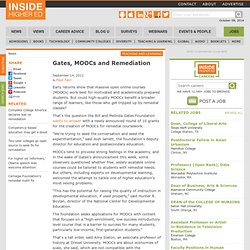
But could high-quality MOOCs benefit a broader range of learners, like those who get tripped up by remedial classes? MOOCs: What role do they have in higher education? After working in the field of Instructional Technology for almost twenty years, I’ve seen many technologies that might impact higher education come and go.
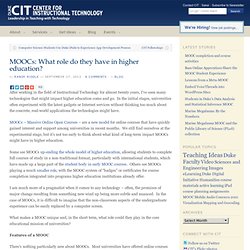
In the initial stages, universities often experiment with the latest gadgets or Internet services without thinking too much about the concrete, real-world applications the technologies might have. MOOCs – Massive Online Open Courses – are a new model for online courses that have quickly gained interest and support among universities in recent months. We still find ourselves at the experimental stage, but it’s not too early to think about what kind of long-term impact MOOCs might have in higher education. Are Your Arms Too Short to Teach a MOOC?
Thank you to guest blogger, Chuck Wight of the University of Utah.
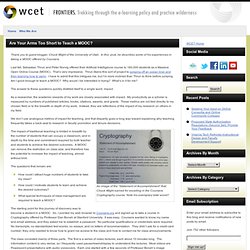
In this post, he describes some of his experiences in taking a MOOC offered by Coursera.